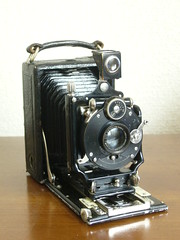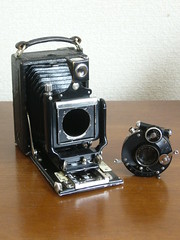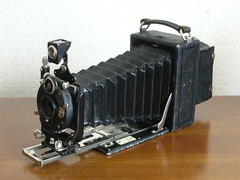Difference between revisions of "Rietzschel"
NihonCamera (talk | contribs) m (added internal link) |
m (Updated LPA link) |
||
| (23 intermediate revisions by 4 users not shown) | |||
| Line 1: | Line 1: | ||
On July 12th 1896 Alexander Heinrich Rietzschel founded the '''Optische Anstalt A. Hch. Rietzschel''' in Schwabing, a suburb of Munich. Rietzschel was an optician and precision mechanic from Dresden who had learned his professions at [[Carl Zeiss Jena]] and had worked some time for [[Rodenstock]] and [[Steinheil]]. | On July 12th 1896 Alexander Heinrich Rietzschel founded the '''Optische Anstalt A. Hch. Rietzschel''' in Schwabing, a suburb of Munich. Rietzschel was an optician and precision mechanic from Dresden who had learned his professions at [[Carl Zeiss Jena]] and had worked some time for [[Rodenstock]] and [[Steinheil]]. | ||
| − | The company's first products were lenses. In | + | The company's first products were lenses. In 1910 the company offered a symmetrical [[Anastigmat|anastigmatic]] lens, the Linear, with 8 elements in only two groups. With this arrangement there were only two groups between which reflections could appear. A similar anastigmatic lens was made by [[E. Suter]]. |
| − | In | + | In 1900 Rietzschel produced its first camera, the '''Clack''', and went on to make many subsequent cameras of various types with variations on this name. Rietzschel's cameras included models for amateurs as well as studio cameras for professionals. In particular, there are many folding cameras with names that are variations on '''Tip''', which are often simpler models corresponding to one of the 'Clack' cameras. |
| + | In 1921 the company was bought by Bayer (of Leverkusen), which handed it over to the film maker [[Agfa]] in 1925, as part of the merger of both in the IG Farben conglomerate. | ||
| + | |||
| + | <div class="floatright plainlinks" style="margin:0px 0px 10px 15px;"> | ||
| + | {{Flickr_image | ||
| + | |image_source= http://www.flickr.com/photos/camerawiki/48721271756/in/pool-camerawiki | ||
| + | |image= https://live.staticflickr.com/65535/48721271756_4cbf48199c.jpg | ||
| + | |image_align= | ||
| + | |image_text= Taschen-Clack 6×6 cm model for roll film or plates,<br/>with f/4.5 Tri-Linear lens and dial-set Compur shutter. | ||
| + | |image_by= eBayer Yalluflex | ||
| + | |image_rights= with permission | ||
| + | }} | ||
| + | </div> | ||
| + | === Cameras === | ||
| + | * [[Auto-Clack]] | ||
| + | * [[Rietzschel Clack|Clack]] | ||
| + | * [[Rietzschel Condor Luxus|Condor Luxus]] | ||
| + | * Film-Tip | ||
| + | * [[Heli-Clack]] | ||
| + | * [[Heli-Tip]] | ||
| + | * [[Multi-Clack]] | ||
| + | * [[Ninon]] | ||
| + | * Opal | ||
| + | * [[Kosmo-Clack]] | ||
| + | * [[Reform-Clack]] | ||
| + | * Roll-Tip | ||
| + | * Spezial-Clack | ||
| + | * Spezial-Tip | ||
| + | * Tip | ||
| + | * [[Taschen-Clack]] | ||
| + | * [[Universal Heli-Clack]] | ||
| + | |||
| + | <br style="clear:both;"/> | ||
| + | <div class="floatright plainlinks" style="margin:0px 0px 10px 15px;"> | ||
{{Flickr_image | {{Flickr_image | ||
|image_source= http://www.flickr.com/photos/89864432@N00/1654141606/in/pool-camerawiki/ | |image_source= http://www.flickr.com/photos/89864432@N00/1654141606/in/pool-camerawiki/ | ||
|image= http://farm3.static.flickr.com/2042/1654141606_cc38a45640.jpg | |image= http://farm3.static.flickr.com/2042/1654141606_cc38a45640.jpg | ||
|image_align= right | |image_align= right | ||
| − | |image_text= | + | |image_text= Rietzschel advertisement, about 1910. |
| + | |scan_by=Uwe Kulick | ||
| + | |image_rights= public domain 1923 | ||
}} | }} | ||
| + | </div> | ||
=== Lenses === | === Lenses === | ||
| − | * Linear | + | * Apotar; a double-anastigmat; each half is a cemented group of three elements (Agfa later used this name for a simple triplet lens). |
| − | * Prolinear | + | * Dialyt; four single elements. |
| − | + | * Linear; a double-anastigmat, each half is a cemented group of four elements, as illustrated here. | |
| − | + | * Prolinear<ref>Japanese collector [http://www.ksmt.com 'ksmt'] shows a [http://www.ksmt.com/eos10d/classic3.htm#185 13.5 cm f/1.9 Prolinear], made for a Mentor 6.5×9 cm Mentor camera. It has four single glass elements, and is essentially a triplet, with the rear element split into two parts, like one version of the Taylor and Hobson Speedic lens. ksmt shows a lens diagram, and photographs of the lens dismantled, and mounted on a DSLR; also sample photographs.</ref> | |
| − | * | + | * Sextar<ref name=Kosmo>[https://www.leitz-auction.com/en/Rietzschel-Kosmo-Clack-Stereo-outfit/AI-11-16105 Kosmo-Clack stereo camera with 65 mm f/6.8 Sextar lenses], sold at the [https://www.leitz-auction.com/en/Cameras/Past-Auctions/Auction-11/ eleventh Westlicht Photographica Auction], in May 2007.</ref> |
| − | * | + | * Solinear; like Agfa's later Solinar, a Tessar-formula lens. |
| + | * Telinear; tele with adjustable focus | ||
| + | * Trilinear; a simple triplet. | ||
| + | * Weitwinkel Apostigmat | ||
| − | = | + | <br style="clear:both;"/> |
| − | |||
| − | |||
| − | |||
| − | |||
| − | |||
| − | |||
| − | |||
| − | |||
{{Flickr_image | {{Flickr_image | ||
| Line 56: | Line 87: | ||
}} | }} | ||
| + | <br style="clear:both;"/> | ||
| + | |||
| + | ==Notes== | ||
| + | <references /> | ||
| Line 62: | Line 97: | ||
[[Category: German camera makers]] | [[Category: German camera makers]] | ||
[[Category: German lens makers]] | [[Category: German lens makers]] | ||
| + | [[Category: Image by rebollo_fr]] | ||
Latest revision as of 05:51, 3 February 2024
On July 12th 1896 Alexander Heinrich Rietzschel founded the Optische Anstalt A. Hch. Rietzschel in Schwabing, a suburb of Munich. Rietzschel was an optician and precision mechanic from Dresden who had learned his professions at Carl Zeiss Jena and had worked some time for Rodenstock and Steinheil.
The company's first products were lenses. In 1910 the company offered a symmetrical anastigmatic lens, the Linear, with 8 elements in only two groups. With this arrangement there were only two groups between which reflections could appear. A similar anastigmatic lens was made by E. Suter.
In 1900 Rietzschel produced its first camera, the Clack, and went on to make many subsequent cameras of various types with variations on this name. Rietzschel's cameras included models for amateurs as well as studio cameras for professionals. In particular, there are many folding cameras with names that are variations on Tip, which are often simpler models corresponding to one of the 'Clack' cameras.
In 1921 the company was bought by Bayer (of Leverkusen), which handed it over to the film maker Agfa in 1925, as part of the merger of both in the IG Farben conglomerate.

|
| Taschen-Clack 6×6 cm model for roll film or plates, with f/4.5 Tri-Linear lens and dial-set Compur shutter. image by eBayer Yalluflex (Image rights) |
Cameras
- Auto-Clack
- Clack
- Condor Luxus
- Film-Tip
- Heli-Clack
- Heli-Tip
- Multi-Clack
- Ninon
- Opal
- Kosmo-Clack
- Reform-Clack
- Roll-Tip
- Spezial-Clack
- Spezial-Tip
- Tip
- Taschen-Clack
- Universal Heli-Clack

|
| Rietzschel advertisement, about 1910. scanned by Uwe Kulick (Image rights) |
Lenses
- Apotar; a double-anastigmat; each half is a cemented group of three elements (Agfa later used this name for a simple triplet lens).
- Dialyt; four single elements.
- Linear; a double-anastigmat, each half is a cemented group of four elements, as illustrated here.
- Prolinear[1]
- Sextar[2]
- Solinear; like Agfa's later Solinar, a Tessar-formula lens.
- Telinear; tele with adjustable focus
- Trilinear; a simple triplet.
- Weitwinkel Apostigmat

|
| Miniature Clack 4×6.5cm with Linear f/6.3 90mm image by eBayer Yalluflex (Image rights) |

|
| Miniature Clack 4x6.5cm removable lens image by eBayer Yalluflex (Image rights) |

|
| Miniature Clack 4x6.5cm removable lens image by eBayer Yalluflex (Image rights) |
Notes
- ↑ Japanese collector 'ksmt' shows a 13.5 cm f/1.9 Prolinear, made for a Mentor 6.5×9 cm Mentor camera. It has four single glass elements, and is essentially a triplet, with the rear element split into two parts, like one version of the Taylor and Hobson Speedic lens. ksmt shows a lens diagram, and photographs of the lens dismantled, and mounted on a DSLR; also sample photographs.
- ↑ Kosmo-Clack stereo camera with 65 mm f/6.8 Sextar lenses, sold at the eleventh Westlicht Photographica Auction, in May 2007.
| Camera industry in Munich |
| Agfa | Deckel | Eder | Enna | Friedrich | Kilfitt | Leitmeyr | Linhof | Niezoldi & Krämer | Perka | Rex | Rietzschel | Rodenstock | Staeble | Steinheil |